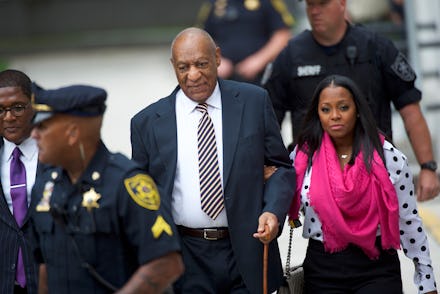Is Bill Cosby's trial televised? Here's why you can't watch the court proceedings live.

Bill Cosby's long-alleged history of sexual assault is finally about to have its day in court — but you won't be getting live updates of the high-profile trial.
Unlike other infamous trials that have been broadcast live — or merely just live-tweeted by journalists on their phones — the judge in Cosby's trial, which begins on Monday, has ruled that no live reports will be coming out of the courtroom. Though Pennsylvania law already bans filming and photography in a courtroom, attendees will additionally be required to turn off their phones while at the trial, NPR reported.
Instead, the public will have to rely on quick updates during breaks in the court proceedings from the 100-plus journalists who will be on hand at the trial.
"We'll be in there hearing all kinds of facts, hearing the stories of witnesses, watching his reaction, watching the jury's reaction," reporter Deanna Durante of NBC 10 told NPR. "And we can't do anything with that information until midday."
According to NPR, court officials cited potential privacy concerns for the witnesses who will be testifying to justify the cell phone rule, along with the fear that some witnesses may try to "perform" in front of such a broad audience.
Given the extremely high-profile nature of Cosby's alleged crimes, the media ban may also be a way to limit how much of a sensationalized media circus the legal proceedings could become. Temple University law professor Kathy Stanchi told NPR the ban is the judge's attempt to "avoid making the trial into some kind of prurient entertainment circus for the public."
"You're probably dealing a little bit with the fear of the unknown potential of new technology," Stanchi said.
Still, for many journalists, the media ban may be seen as a hamper on reporters' ability to pass on the events that they're seeing first hand.
"At worst, what it does is it guarantees that a less accurate version of events will get out to the public," Gregg Leslie of the Reporters Committee for Freedom of the Press told NPR. "So what's the benefit in that?"